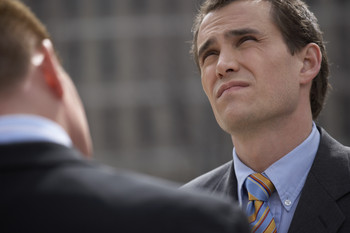

|
Is there too little money in political campaigns? - Political Professional There is too little, not too much, money in politics. The one billion dollars spent annually by candidates and political parties is a pittance when compared to the size of the Federal budget.
In a recent editorial, conservative columnist George Will challenged the assumption that there is too much money in politics. Will echoed the sentiments of many interest groups -- liberal and conservative alike -- that giving money is a form of participation, and further efforts to regulate political giving will function to constrain, not enhance, participation. Will is correct. There is too little, not too much, money in politics. The one billion dollars spent annually by candidates and political parties is a pittance when compared to the size of the Federal budget. But Will's analysis begs the question -- why are so few Americans participating? And if the McCain-Feingold bill won't improve politics, then what will? Reforming our political process is an expensive proposition -- but few Americans give to political causes. According to the Center for Responsive Politics, in the year 2000, less than .05 percent of adult Americans gave $200 or more to the candidate or party of their choice. Fifteen thousand individuals were responsible for 33 percent of the dollars raised during the 2000 presidential campaign, and the largest 100 special interest groups raise approximately 40 percent of all dollars spent in federal campaigns. Because they dominate political giving, special interests shape our nation's political agenda. Campaign finance reform proposals like McCain-Feingold assume, and therefore reinforce, the notion that only a small fraction of Americans are capable of investing politically and steps must be taken to curb the influence of those who do. Reformers argue that politics will become more equitable by limiting the ability of special interests to raise and spend funds, not by encouraging more individuals to invest. But compare this to philanthropy, where individual giving completely overshadows institutional involvement. American culture encourages giving to improve the well being of our communities, to cure disease, ease suffering, and preserve natural resources. According to Giving USA 2002, individuals gave $212 billion dollars to charity in 2001. Eighty-nine percent of American households contribute to charitable organizations, and institutions account for only 16.7 percent of all charitable giving. Americans have been fooled into thinking that we don't need to invest in the development of our greatest national treasure -- our democracy. Are there reasons why we don't give politically? Of course. Political contributions are no longer tax deductible. Democrats and Republicans alike use funds on negative campaigns, attack mailings, and manipulative "issue" ads. Contributing $100 to a local homeless shelter makes you feel good. Giving $100 to a political campaign can leave you feeling in need of a shower. But if we want to improve the conduct of political campaigns and ensure that vital issues are debated and discussed, then ordinary Americans must apply our philanthropic know-how to the political arena. Further regulating the supply of special interest dollars will not change the status quo. New forms of political expression are needed to reconnect the American people to the political process, and those new forms of expression need to be nurtured, supported and funded. John B. Opdycke is director of development at the Committee for a Unified Independent Party, Inc. (www.cuip.org), a non-partisan research and strategy center for the independent political movement. |
Unauthorized duplication in part or whole strictly prohibited by international copyright law.
 It's anticipated that the Supreme Court will rule this summer on the constitutionality of the Bi-Partisan Campaign Reform Act of 2002 (McCain-Feingold). Supporters claim the bill will improve political discourse and create opportunities for participation. But will "getting the money out of politics" actually enhance the power of the American people?
It's anticipated that the Supreme Court will rule this summer on the constitutionality of the Bi-Partisan Campaign Reform Act of 2002 (McCain-Feingold). Supporters claim the bill will improve political discourse and create opportunities for participation. But will "getting the money out of politics" actually enhance the power of the American people?